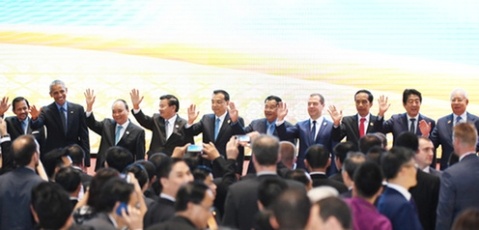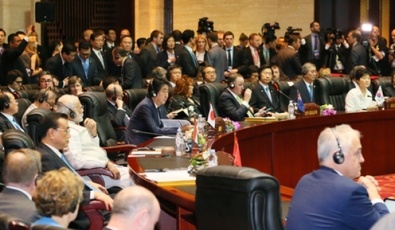Asia
The East Asia Summit
September 8, 2016
 pool photo
pool photo
 Photo: Cabinet Public Relations Office
Photo: Cabinet Public Relations Office
The East Asia Summit (EAS) was held in Vientiane, Laos. Prime Minister Shinzo Abe attended the meeting. The overview is as below. The meeting was chaired by His Excellency Dr. Thongloun Sisoulith, Prime Minister of Laos.
1 Review and Future Direction of the EAS Cooperation
(1) Prime Minister Abe stated the following.
(i) Counter-terrorism measures
Japan will provide 45 billion yen and conduct human resources development for 2,000 personnel over the next three years to support the enhancement of counterterrorism capabilities, including border measures, for the sake of countering terrorism and violent extremism in EAS participating countries. Also in order to deal with violent extremism, which is the root cause of terrorism, we intend to contribute even more actively through a comprehensive approach, including encouragement of moderation through personnel exchanges, educational activities and other initiatives, and support for social and economic development that underpins a moderate society.
(ii) Strengthening of the EAS
I stress that the functions of the EAS should be further strengthened as the premier forum in the region. It is our desire to steadily implement the Kuala Lumpur Declaration on the Tenth Anniversary of the ES and to promote further vitalization of the discussions in the political and security areas in the EAS.
(iii) Maritime Cooperation
Japan supports the proposal to add maritime cooperation to the EAS priority areas of cooperation. Japan hopes to deepen discussions concerning maritime cooperation. In particular, human resources development is highly important as an investment for the future. Japan has already reached its goal of human resources development for approximately 700 personnel over three years in ASEAN that we announced in 2014. Our current plan is human resources development for approximately 1,000 personnel over the next three years.
(iv) Sustainable Economic Development in East Asia
As Trans-Pacific Partnership (TPP) has a great significance, we intend to exert our utmost efforts for TPP's early entry into force. The Regional Comprehensive Economic Partnership negotiations are an important pillar of the economic integration of East Asia. We intend to negotiate actively for the early conclusion of a comprehensive, well-balanced, and high-level agreement.
(v) The Vital Artery of Growth and Prosperity
Supply chains are spreading from Asia to Africa, turning the region into a single economic zone. We extend "vibrant and effective connectivity" to Africa by promoting the development of infrastructure and human resources, turning the area that extends from Asia to Africa into the vital artery of growth and prosperity.
(2) Many leaders pointed out the importance of the EAS. At the same time, many leaders strongly condemned recent terrorist attacks, and stressed the importance of counter-terrorism measures and collaboration among the EAS participating countries. In addition, several leaders pointed out that maritime cooperation should be added to the EAS priority areas of cooperation.
(i) Counter-terrorism measures
Japan will provide 45 billion yen and conduct human resources development for 2,000 personnel over the next three years to support the enhancement of counterterrorism capabilities, including border measures, for the sake of countering terrorism and violent extremism in EAS participating countries. Also in order to deal with violent extremism, which is the root cause of terrorism, we intend to contribute even more actively through a comprehensive approach, including encouragement of moderation through personnel exchanges, educational activities and other initiatives, and support for social and economic development that underpins a moderate society.
(ii) Strengthening of the EAS
I stress that the functions of the EAS should be further strengthened as the premier forum in the region. It is our desire to steadily implement the Kuala Lumpur Declaration on the Tenth Anniversary of the ES and to promote further vitalization of the discussions in the political and security areas in the EAS.
(iii) Maritime Cooperation
Japan supports the proposal to add maritime cooperation to the EAS priority areas of cooperation. Japan hopes to deepen discussions concerning maritime cooperation. In particular, human resources development is highly important as an investment for the future. Japan has already reached its goal of human resources development for approximately 700 personnel over three years in ASEAN that we announced in 2014. Our current plan is human resources development for approximately 1,000 personnel over the next three years.
(iv) Sustainable Economic Development in East Asia
As Trans-Pacific Partnership (TPP) has a great significance, we intend to exert our utmost efforts for TPP's early entry into force. The Regional Comprehensive Economic Partnership negotiations are an important pillar of the economic integration of East Asia. We intend to negotiate actively for the early conclusion of a comprehensive, well-balanced, and high-level agreement.
(v) The Vital Artery of Growth and Prosperity
Supply chains are spreading from Asia to Africa, turning the region into a single economic zone. We extend "vibrant and effective connectivity" to Africa by promoting the development of infrastructure and human resources, turning the area that extends from Asia to Africa into the vital artery of growth and prosperity.
(2) Many leaders pointed out the importance of the EAS. At the same time, many leaders strongly condemned recent terrorist attacks, and stressed the importance of counter-terrorism measures and collaboration among the EAS participating countries. In addition, several leaders pointed out that maritime cooperation should be added to the EAS priority areas of cooperation.
2 Exchange of Views on Regional and International Issues
(1) Maritime Security
(i) Prime Minister Abe stated the following.- Maritime order based on the principles of international law, including the freedom of navigation and overflight, is of crucial importance to the peace and prosperity in the region. From such a perspective,it was agreed at the G7 Ise-Shima Summit this May that 1) States shall make their claims based on international law, 2) States shall not use force or coercion in trying to drive their claims, and 3) States shall seek to settle disputes by peaceful means, including arbitration.
- However, in the last few months, unilateral attempts to change the status quo in the East China Sea and the South China Sea continue, and Japan is seriously concerned about it. It is the rule of law that is the universal principle that must be strictly adhered to by the international community. All parties should exercise self-restraint over actions that may increase tension in the region, and should seek peaceful resolution based on international law including the United Nations Convention on the Law of the Sea (UNCLOS).
- As the ASEAN member countries have faced various difficulties with regard to the South China Sea issue, Japan has always supported ASEAN centrality and unity. The Chairman's Statement of the ASEAN Summit issued yesterday (7 September) explicitly refers to phrases such as "full respect for legal and diplomatic processes" which we highly value.
- While we welcome dialogue between China and ASEAN, the dialogue should be based on international law, on the premise that non-militarization and self-restraint will be maintained on the ground. Japan expects that the commitment made in the EAS last year of not pursuing militarization will be implemented. The Philippines-China arbitral award is legally binding on the parties under UNCLOS. The Tribunal's award is not on territorial sovereignty, but is related to universal value of UNCLOS as well as its interpretation. Japan expects that parties' compliance to with the award will eventually lead to the peaceful settlement of disputes in the South China Sea.
(2) North Korea
(i) Prime Minister Abe stated the following.North Korea has launched approximately 20 ballistic missiles since the beginning of this year. Three ballistic missiles launched by North Korea on September 5, when the G20 Summit was being held, fell into Japan's exclusive economic zone. Such an act is unprecedented and unforgivable. North Korea's missile capability, including that of intermediate-range ballistic missiles and submarine-launched ballistic missiles, is a grave threat to the security of Japan and the region. Repeated provocations by North Korea are a clear challenge to the international community. There is no other way but to augment pressure on North Korea through strict implementation of the UN Security Council (UNSC) resolutions. The human rights and humanitarian issues of North Korea are serious. In particular, the abductions issue is the most important issue that concerns Japan's sovereignty and the lives and safety of Japanese people. We call for understanding and cooperation of the relevant countries for early resolution.
(ii) Many leaders discussed the situation on North Korea, expressed concerns over nuclear and ballistic missile development, and urged North Korea to comply with the UNSCRs resolution since series of missile launches are in violation of the UNSCRs resolutions and threatening stability in the region.
(3) EAS Statement on Non-proliferation
Many leaders including Prime Minister Abe pointed out the importance of the EAS Statement on Non-proliferation, leading to its adoption. It was very meaningful that all 18 EAS participating countries, including China, Russia and ASEAN member states, stood united to issue the statement right after the missile launch by North Korea amid the G20 Summit.(4) Japan-China-ROK Cooperation
Prime Minister Abe stated the following.Japan, China and the Republic of Korea (ROK) share a major responsibility for peace and prosperity in the region. Japan will host the Japan-China-ROK Summit as this year's chair on the basis of the Japan-China-ROK Foreign Ministers' Meeting held in Tokyo last month. Japan hopes to strengthen cooperation among the three countries.

